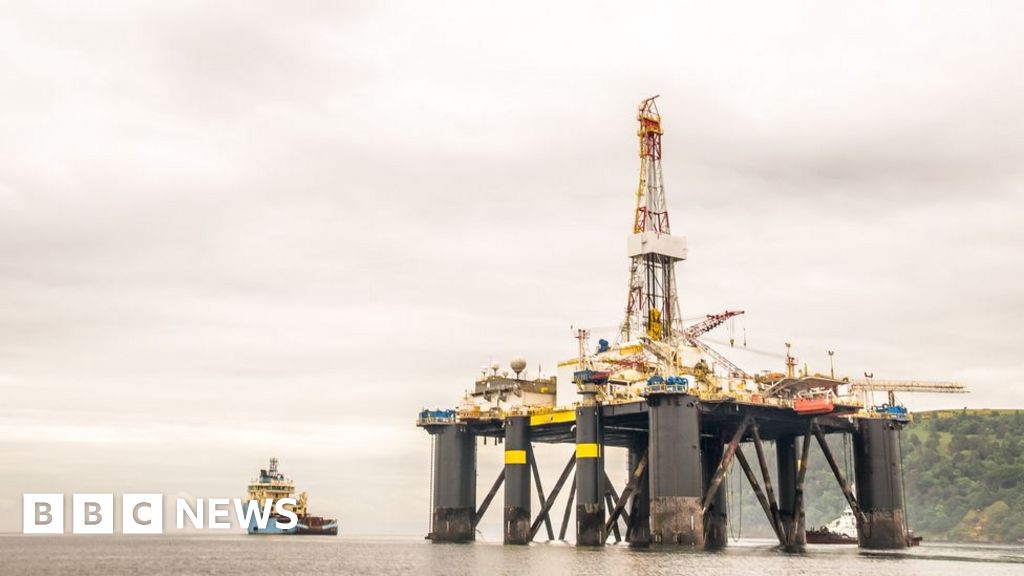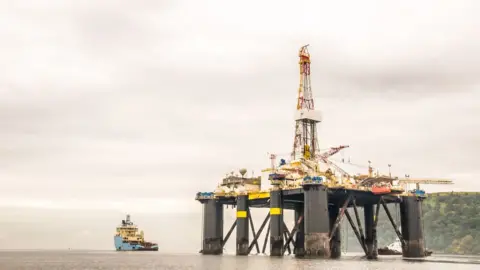Jobs
How will Scotland vote on oil and gas policies?

By James Cook, Scotland editor
 Getty Images
Getty ImagesWhen BP struck oil in the North Sea in 1970, Aberdeen struck gold.
The discovery of the giant Forties Field was the beginning of a boom which brought jobs for the city, profits for energy giants, and taxes for the Treasury.
It fuelled the rise of nationalism too, with the UK government privately acknowledging that oil had the potential to make an independent Scotland one of the richest nations in Europe.
But North Sea production peaked 25 years ago and in this general election the focus is on managing a shift to renewable energy including wind, wave and solar.
The UK’s main political parties are signed up to reaching “net zero”, which means a nation taking out more greenhouse gas emissions from the atmosphere than it puts in.
But when it comes to the pace of change they are being pulled in different directions.
Environmentalists are urging the UK to immediately slash its production of fossil fuels such as oil, gas and coal.
Industry leaders, trade unionists and local officials are all worried about the economic impact of a rapid transition to greener energy projects.

The trade body Offshore Energies UK (formerly Oil & Gas UK) says the sector added £30bn to the economy in 2022, supporting 200,000 UK jobs including 90,000 in Scotland.
If you stopped oil and gas production immediately, says Andy Shirreffs, who works offshore, “you’d bankrupt this area. This place would be devastated.”
“This is how I make my living,” he adds. “This is how I feed my kids and put them through education and if I can’t do that, then I’m struggling.”
But are oil and gas firms struggling?
In 2022, after global oil prices were pushed up by Russia’s invasion of Ukraine, BP made $27.7bn. Shell’s profits were $39.9bn, the highest earnings in its 115-year history.
The UK Conservative government responded with a windfall tax – a levy imposed on companies that have benefited from something for which they were not responsible.
It pushed the overall rate of tax on oil and gas production to 75%, which will apply until at least March 2029 if the Tories win Thursday’s election.
Labour wants to increase the rate to 78% and to remove some tax breaks for investment.
The Liberal Democrats’ manifesto proposes a “proper, one-off windfall tax on the super-profits of oil and gas producers and traders”.
The Scottish National Party says it supports the existing windfall tax rate, adding that further powers over taxation should be devolved to the Scottish Parliament.

Ryan Crighton of Aberdeen and Grampian Chamber of Commerce says the windfall tax was supposed to be a one-off but has now been extended for six years and is having an impact on jobs.
He is even more concerned about the removal of the investment tax breaks which, he says, mean that firms “can’t recycle profits into new projects and create more jobs in the economy here”.
The issue is a hot topic in three north east Scotland seats where polls suggest the SNP are, after boundary changes, challenging incumbent Conservatives.
But politicians also face more fundamental questions about the UK’s energy mix.
First, who owns the nation’s natural resources, and who should profit from them?
Campaigners for Scottish independence have long argued that the riches beneath the North Sea should have been exploited for public not private gain.
They point to the example of Norway, which in 1972 set up a state-controlled company to extract its share of North Sea oil, investing the proceeds in a sovereign wealth fund.
That debate about public versus private ownership has flared again in relation to renewable energy.
In 2022, Labour promised to set up Great British Energy, a “publicly-owned clean energy generation company,” which the party later said would operate like Sweden’s Vattenfall or Denmark’s Orsted.
But in subsequent interviews, senior Labour figures including the leader Sir Keir Starmer said GB Energy “would be an investment vehicle…not an energy company”.
Unions say they would like more clarity about the plans.
Unite, which says it has thousands of members in the offshore oil industry, has refused to endorse Labour’s manifesto in part because of the party’s energy policy.
Last week the union, which has previously donated large sums to Labour, organised a demonstration in Aberdeen, explicitly criticising the party.

Waving banners, union members chanted “no ban without a plan”.
“We don’t want a repeat of what happened to the miners,” said Unite organiser Claire Peden, adding: “We’re saying no more blank cheques for the Labour Party.
“If they don’t side with workers, don’t side with communities, obviously that funding will fund campaigns like this instead of going to the party.”
Ms Peden says under Labour’s current plans up to 100,000 workers could lose their jobs, including as many as 35,000 in Scotland.
Are such warnings credible?
It depends, says Prof Paul de Leeuw, director of the Energy Transition Institute at Aberdeen’s Robert Gordon University.
He says if there is “no support for the industry” with an immediate halt to all investment then there will be “a massive job impact”.
However, Prof Leeuw adds, that is “unlikely” because “what we will see hopefully is an offset from the renewable sector. One declines, the other one is increasing”.
“We need to get it just right,” he concludes.
That leaves the other fundamental question – should any new oil exploration be approved at all?
The Conservatives say yes. The SNP and Lib Dems maybe. Labour, no.
Some climate campaigners say that is not enough, arguing that even existing drilling licences should be revoked, with production ceasing immediately.
Critics of that position say the UK economy is still deeply reliant on oil, and shutting down the North Sea would simply force the nation to import more from abroad.
Environmentalists point out that human activity has been the leading cause of climate change since the Industrial Revolution transformed the British economy from farming to manufacturing in the 18th Century.
“When burnt, fossil fuels release carbon dioxide into the air, causing the planet to heat up,” explains the Met Office.

“I feel like I’m just so disappointed that there’s a lack of leadership, a lack of bravery and courage,” says Alison Stuart of the campaign group Aberdeen Climate Action.
“We need to get to net zero,” she adds.
A quarter of a century on from the peak in production, that is not in dispute in Aberdeen.
It is the speed of that change and how it is managed where disagreements remain.
Handling the transition looks certain to be a major challenge for whoever forms the next government.
You can find out more about all the parties’ policies on oil and gas and climate change in our manifesto guides on the BBC News website.







